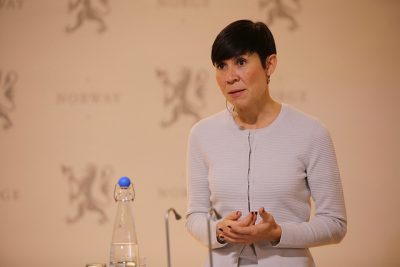Norwegian Defense Minister Ine Eriksen Søreide has been forced into defense mode herself in recent weeks. Now she faces even more highly critical reports from the State Auditor General’s Office, this time over the sale of retired fighter jets, while her ministry also reportedly tried to get the state auditors to tone down their criticism of a lack of national preparedness.

“It’s not the nation’s security the Defense Ministry wanted to protect,” State Auditor General Per-Kristian Foss told newspaper Dagens Næringsliv (DN) late last week. “It was the military and the ministry against (our) criticism, by softening words and expressions.”
That’s particularly tough criticism from a man who’s been a political colleague of Søreide for years. Foss is a former finance minister for the Conservatives who withdrew as a Member of Parliament and became State Auditor General. Søreide is also a longtime member of the Conservatives who now finds herself under harsh criticism from another Conservatives’ veteran.
Foss’ salvo came in the aftermath of his explosive state auditors’ report on a woeful state of national security that Søreide and her government has also tried to keep secret. The full report remains classified, while DN obtained, and has published, a summary of the state auditors’ main points. Søreide then opted to launch a probe into who leaked it to DN.
‘Systematic weakness’
Now she’s under attack by Foss again, for allegedly trying to “twist our formulation of what we believe is ‘systematic weakness'” within the ministry “to ‘individual’ cases of weakness.” Foss claimed that would be like trying to attach blame to the individuals involved, and not to the top leadership that is ultimately responsible. DN reported an example of that: The State Auditor General (Riksrevisjonen) wrote in its report that “The Defense Ministry and the military have not to a sufficient degree made sure that the Home Guard (Heimevernet) is able to secure and protect critical infrastructure.” In order for the report to be declassified, the ministry demanded the sentence be rewritten to: “There are weaknesses within the Home Guard’s security and protection of critical infrastructure.”
Minister Søreide then tried to claim, in a letter to the Parliament, that the calls for revising and “softening” the report “were not anchored with the department’s or ministry’s leadership.” She later told DN that “everthing that happens in the ministry is my responsibility … the point was to simply make the Parliament aware that the dialog between the ministry and the State Auditor General goes on at a case-worker level. It was the starting point for the process. We wanted to arrive at a document that could be declassified.” Foss and his team felt they couldn’t come any further and their main report thus remains classified despite calls from many Members of Parliament that it be publicly released.
‘No rules were followed’
Now Søreide finds herself in more hot water, over the State Auditor General’s report on the sale of Norway’s old F-5 fighter jets. Foss’ auditors have concluded that the sale was characterized by a “serious lack of control” and insight into the buyers.
At a press conference in Oslo this week, Foss claimed that neither the Defense Ministry nor the Foreign Ministry followed regulations applying to the sale of defense material. “This has been terribly handled by the Defense Ministry,” Foss told reporters. “No rules were followed. This is a textbook example of what should not be done.”

The sales process began in 1999, during the former left-center government headed by Jens Stoltenberg, and lasted until 2015, two years after the current conservative coalition of which Søreide is part took over government control. Two of the 15 F-5 fighter jets were sold in 2015 to a company in Texas called Northern General Leasing (NGL) for just NOK 116,000 (around USD 20,000 at the time) each. Twelve of the jets were given away to schools and a museum, while one is used for training.
When the 15 jets were put up for sale, the military set a minimum price of NOK 6.6 million each, or NOK 100 million all together. That was never achieved, while newspaper Dagbladet has earlier reported that Norwegian authorities had little if any knowledge about NGL (the lone buyer) other than it was tied to billionaire Ross Perot Jr. Nor did the Norwegians know what NGL would do with the jets.
The State Auditor General is now harshly scolding both the defense and foreign ministries and the military’s logistics’ organization over how the entire process was conducted. They’re accused of poor documentation, deficient archiving and, thus, an inability to track down the reasoning behind the decisions made.
“Documents can’t be found. They were not properly archived. The worst thing is the clear lack of understanding for export control regulations,” Foss said at the press conference. “There’s been deficient routines for control over prospective buyers, even though the military is responsible as exporter.”
In this case, both the defense and foreign ministries are admitting their mistakes, and weren’t surprised by the auditors’ criticism. Similar weaknesses had been uncovered in their own internal reviews of the transaction.
“We have imposed a string of improvements,” claims the defense ministry, to ensure better sales processes in the future, while the foreign ministry claims it now has a new digital system that strengthens tracking of export controls.
newsinenglish.no/Nina Berglund

